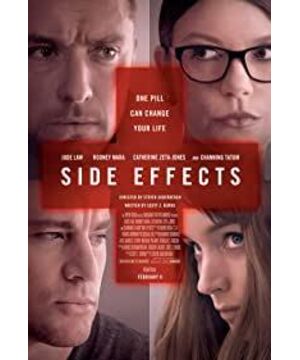There are too many blank spaces in "Side Effects". Regarding the motive of the crime and the clues about the relationship between the characters, Soderbergh left the right to think to the audience, instead of blindly explaining the whole story and the moral instillation of the characters' motives. The film uses a lot of spectator-style calmness and a lot of talkative dialogue scenes to string together the entire story, which is very pedantic and social, and is not at all the simplicity and rudeness of a typical suspense film.
So, what I want to say is that there are many "blanks" about the film, which are only my subjective thinking, not particularly professional, or even very one-sided and superficial. Senior movie fans can read it as a joke, and don't take it seriously.
————————————————————
After watching, many people expressed that they were not clear about the heroine’s motive for committing the crime, and the film did not make a detailed description.
In a nutshell, the motive provided by the film is that the heroine fell into extreme depression because her husband was arrested and imprisoned on the day of her wedding, and had a same-sex relationship with her female psychiatrist. The heroine wanted to completely give up her husband and daughter who were in prison. The psychiatrist was together, and the two made huge sums of money from the murder of the heroine's husband. Therefore, with the professional help of the female psychologist, the heroine pretended to be a deeply depressed patient after her husband was released from prison and took antidepressant. Because of the sleepwalking side effect produced by the drug, he killed his husband, so he was acquitted by a judicial ruling and sympathized by the public, so that he could get away with impunity and live Lala's sweet life together.
Many people questioned that this motive is untenable. First of all, is the heroine really Lala? She is in a normal relationship with a man and is preparing for a happy married life. It can be seen that she is not a real Lala. Secondly, when I look at a female psychiatrist, is she also a real Lala? In the career of female psychiatrists for so many years, why did they choose the heroine instead of other women, is it just because of love at first sight? And why did the heroine fall into the arms of a female psychiatrist, but not other female friends in her life? It would be even more untenable to explain that they were bisexual.
Without answering these questions in the previous paragraph, let me talk about the plot of a short story I read. The story of the film reminds me of a short story "Waiting for a year and a half" by Matsumoto Kiyosho, a famous Japanese socialist mystery novelist (included in the newly published classic collection "Big Hands", interested friends can find it) . In the story of "Waiting for a year and a half", an ordinary Japanese woman finally murdered her husband because she couldn't bear the mediocrity of her husband's idle work and drinking at home all day long. The woman in the story not only has to go out to sell insurance like a man, but also has to raise children and face the domestic violence of her husband after drinking. After spending the money earned by his wife drunk and squandering it, no matter how hard he tries to earn more salary, the poor family still has no money to repair the damaged tatami. The woman couldn't bear it any longer, so after careful planning, the woman first arranged for her husband to meet her unmarried coquettish single female classmate who opened a bar, and then let her husband cheat with the female classmate, making her husband more and more tired and hating her. Once again, on the night of her husband's drinking and domestic violence and threatening to divorce her, the woman killed her husband on the grounds that she could no longer stand her husband's punches and kicks and protect her children. This incident caused an uproar in Japanese society, which was still dominated by men. Everyone in the society condemned this unscrupulous husband. Feminists even stood on the woman's side and pleaded with the judge for her. In the end, the woman was arrested. Acquitted. When the public thought that this was helping a poor woman with justice, a strange man whom the woman knew at work suddenly appeared, and he then told the president of the Feminist Association, who had been helping women in lawsuits, about the murder of the woman's relatives. husband's trick. This man was with the woman before the woman's husband died. The premise of the relationship between the two turned out to be that the woman kept claiming that she was single. After the man proposed to the woman, the woman asked the man to wait for her for a year and a half, and this year Half the time is when the woman calculates that her husband is trapped and eventually murdered. Therefore, the man instantly understood that the woman was deliberately murdering her husband, not her self-defense.
I tell this story because I want to talk about the "husband-killing" complex. The heroine of the film's story also deliberately murdered her husband through four years of preparation and pretending to be crazy. This is the key to the reason why the heroine murdered her husband. four years.
Stories about "killing a wife" are common, but few about "killing a husband". In some real cases of husband-killing, women's motives for killing their husbands are mostly because they can't bear the domestic violence of their husbands, or because their husbands have an affair and thus hold a grudge.
But looking back at the heroine's motive for killing her husband, it seems very untenable from the appearance. The heroine's husband loves the heroine very much, and after he was released from prison, he also wanted to provide the heroine with a good life and strive to expand and establish career opportunities. He loves the heroine in every possible way, and is a typical gentle, considerate and handsome husband, but the heroine still murdered her husband without hesitation.
why? This has to be traced back to the four years during which the husband was in prison. These four years were the crucial four years for the heroine’s murderous intention. The arrest and imprisonment of the husband on the wedding day was the first point of stimulation for the heroine’s disappointment with her husband. , the promises and future happy life that she once made were ruined because her husband violated the law carelessly. The woman has already developed resentment, not to mention the taboo and rejection of the woman as the wife of a prisoner by the public. The family factor without two parents also makes him very afraid of the insecurity of being abandoned. At the beginning of her husband's arrest and imprisonment, the woman had no friends to share her worries, so she went to a psychiatrist to express her worries. Unfortunately, the psychiatrist the woman met happened to be a middle-aged woman who was extremely dissatisfied with her husband. The film explained that the female psychiatrist's husband had an affair with a sexy model and abandoned him. As a result, the two women who were dissatisfied with their husbands formed a feeling of sympathy and sympathy for each other. In the extreme emptiness, loneliness, coldness, and disappointment with men, they gradually developed sexual desires for each other, which developed into a physical relationship. It can be said that the physical dependence between the heroine and the psychiatrist is beyond love itself, that is to say, the two were not together because of pure liking for each other's lala emotions, but only because of the company of mutual comfort. This explains the question I raised at the beginning, are the heroine and the female psychiatrist really Lala? Personally, I think they are obviously not, but because of their disappointment with their respective husbands and the despair of the opposite sex, they finally came together.
Therefore, it can be said that the female psychiatrist is the key figure in igniting the motive of the female protagonist to kill her husband. The female psychiatrist released her resentment towards her husband and even applied it to the heroine, using the heroine's disappointment with her husband in prison and using her brainwashing as a puppet. The female psychiatrist is to satisfy her desire to take revenge on her husband (obviously she does not want to kill her husband by herself, the motive for doing so is very obvious and cannot escape legal punishment), and on the other hand, it is to make money, and she clearly understands it through constant communication with the heroine. The financial benefits that can be obtained after the murder of the hostess' husband. The female psychiatrist uses her profession to constantly brainwash the heroine, teach the heroine how to pretend to be depressed, and seize the small pigtails that antidepressant drugs will cause side effects, and finally want to pass the responsibility to the drug company and the heroine's male psychology The doctor, thereby obtaining social ethical sympathy, helping the heroine to avoid criminal responsibility, and obtaining huge compensation, the two of them sold off the stolen goods and got away with impunity.
It can be said that the first motive of female physicians is the basic emotional motive, while the earning of money is the real motive. The pure heroine has been used by the female doctor from the very beginning. Killing her husband and exempting her from punishment is just a cover for the female doctor to reassure the heroine to kill. Personally, I think that with the female doctor's motives and viciousness, the female lead will definitely not get a penny in the end, and the female doctor will definitely continue to use her own professional means to put the female lead into a mental hospital in order to save all her profits (the female doctor). The doctor's subsequent phone message with Xi De Luo can be seen in his mind, and he wants to bribe Xi De Luo through Xi De Luo's appraisal certificate to get the court to rule that the heroine must stay in a mental hospital for life, which is to imprison her for life). But the trick of the female doctor was finally exposed by the male psychiatrist (Xideluo) who was in charge of the spiritual appraisal of the heroine. Xideluo finally used the female lead to set a trap for the female doctor, so as to catch the female doctor and clean it up for herself. Yes, of course, the heroine was eventually imprisoned. After all, she was guilty of sin, and even the victim who was used by others could not escape the responsibility. In the end, the film still preached the theme of justice over evil. I have to feel sorry for the heroine. After being used by two psychiatrists, not a neuropathy will be forced into a neuropathy.
Therefore, it can be said that the motive of the female protagonist to kill her husband is that she has the basis of dissatisfaction with her husband, and the second is that she was instigated by the female doctor's brainwashing, and the origin of the motive is the resentment of the female doctor to her husband. It coincides with the meaning of the title "side effect". Emotions are the easiest to use. One bad emotion may produce more bad emotions, which will eventually lead to fatal despair, mental illness, and even motives for murder or suicide. The heroine was caught in too many negative emotions of her husband's arrest, and she relied too much on the female doctor. She pinned her vision for a better life in the future on the female doctor. She took advantage of her negative psychology and sense of hope, and all her emotions expanded infinitely and eventually led to tragedy. There are also cases of psychiatrists brainwashing patients by using knives to kill. A 45-year-old female psychiatrist in the United States was a male patient who brainwashed herself, and thus killed her cheating husband by the hands of the male patient.
Therefore, the story of the film is actually very simple. It tells the story of a female psychologist who brainwashed her female patient and used her disappointment with her husband to control her murder of her husband and ultimately profit. The female psychiatrist is the real protagonist of the story, and the big boss behind the scenes. It seems that the arrangement of the heroine as the heroine is just a pretense. From the perspective of the heroine, she is too talented, and then arranging to attack Delo against the big boss is even more genius. Arrangement, so that the audience fell into layers of fog, at first thought it was a social care theme focusing on people with depression, and then thought it was a social ethics story that exposed the huge violent industry chain of antidepressants, but covered the gray area of drug side effects, and finally Only then did I know that this is a story of murder by knife, focusing on the relationship between doctors and patients, and finally questioned the defects and hidden dangers in the deep dependence between psychologists and patients in Western countries. This layered performance structure is more captivating than the film's story itself!
Just imagine, if the heroine of the story arranged a female psychiatrist, it would be just a mediocre suspenseful work. Therefore, Soderbergh's pretense is really good, and the blank space is amazing!
In addition, let's talk about the male psychiatrist played by Xi De Luo. I don't think he is a righteous figure. After he was found to be trapped in the trap set by two women, he debunked the deception through his own reasoning and efforts and successfully escaped. But in the end, he did not help the real victim, the heroine. Instead, he took advantage of this poor woman like a female doctor. In order to protect his work, family and reputation, he still put the heroine in a mental hospital and imprisoned her. Alas, helpless. Therefore, although women are vicious, they are too emotional, while men are more rational and cautious. Xi Deluo clearly grasped the emotionality of women and collected them all. So no matter how vicious a woman is, she is no match for a male psychiatrist with a high IQ and baldness! This is why it is easy to kill a wife and difficult to kill a husband, and the aftermath is the key to testing reason and high IQ. . . . . Therefore, Xi De Luo is just a villain who protects himself. He is not to help the victim's family. The most naked and dirty part of the film's human nature is finally reflected in Xi De Luo.
View more about Side Effects reviews











